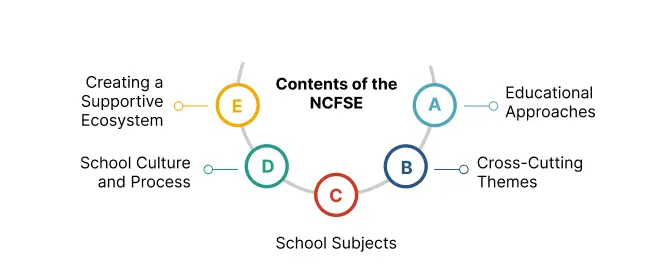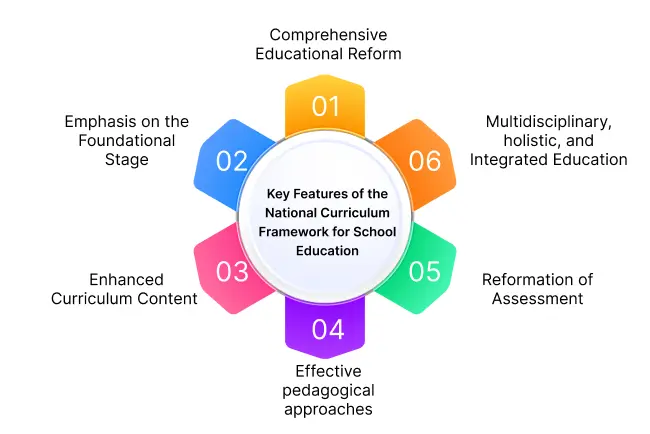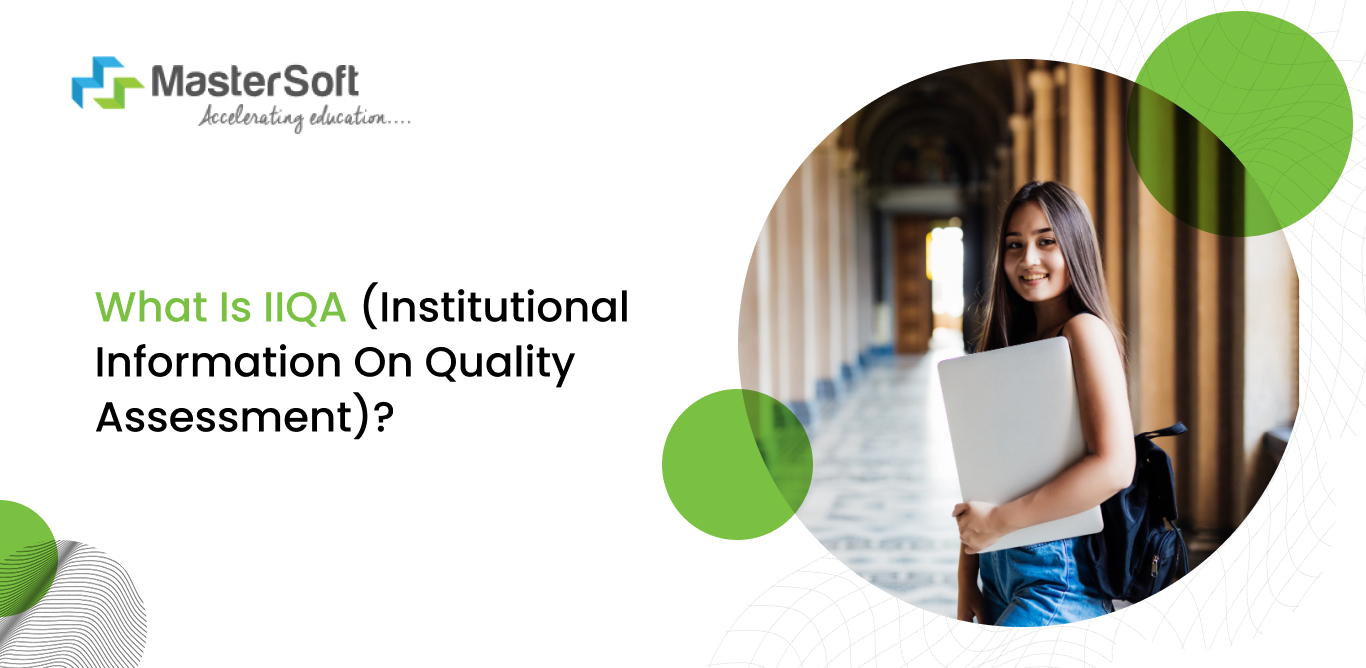02, Sept 2024
The biggest strength of a country lies in its children and youth, who grow up to become distinguished individuals and contribute to nation-building. However, government initiatives and educational institutes must align to ensure quality education.
That is why NCFSE is a crucial part of the educational reformation in India. In fact, it provides a foundation and mechanism for schools to introduce revolutionary changes in the academic structure.
Besides, improved teaching and learning methodologies and the fulfillment of student learning outcomes are a few advantages that NCFSE guarantees.
What is NCFSE?
The NCFSE, or National Curriculum Framework for School Education, is a guiding document that sets the core for India’s school education system. It has been introduced in accordance with the National Education Policy 2020.
Furthermore, it provides an elaborate framework for K–12 education for children ages 3 to 18. It aims to improve curriculum development. Also, improvement in pedagogical and assessment approaches across India is a major objective.
The framework emphasizes comprehensive development that extends beyond the academic area. It encapsulates social-emotional learning, critical thinking, and cognitive development. Besides, since it will have a significant impact on the education system, it is only fitting to take a look at the content of the framework.
Contents of the NCFSE

The National Curriculum Framework for School Education has been divided into five distinct parts, each of which covers different aspects of education:
Part A: Educational Approaches
Part A covers the aims and curricular areas of school education, school stages—logic and design, approach to learning standards, content, pedagogy, and assessment—and time allocation.
Part B: Cross-Cutting Themes
Part B includes rootedness in India and Indian knowledge systems, values and dispositions, learning about and caring for the environment, and inclusion in schools. Moreover, it includes guidance and counselling in schools and educational technology in schools.
Part C: School Subjects
Part C puts emphasis on learning in the foundational stage: language education, mathematics education, science education, and social science education. Also, it includes art education, education in interdisciplinary areas, physical education, and well-being. Likewise, vocational education and subjects in Grades 11 and 12 receive equal focus.
Part D: School Culture and Process
Part D relates to the processes and approaches that schools need to create a rich, vibrant, and engaging learning environment. Consequently, it will lead to students gaining an immersive learning experience.
Part E: Creating a Supportive Ecosystem
Part E gives importance to capacity building for implementation, ensuring an appropriate environment for learning, and enabling and empowering teachers. At the same time, it stresses community and family engagement.
Therefore, the following key features of the current National Curriculum Framework will ensure alignment with the core content:

Key Features of the National Curriculum Framework for School Education
Comprehensive Educational Reform
The first and foremost feature of school education is that it will undergo a major transformation. Therefore, the framework recommends appropriate resolutions and directives to accommodate the same to accomplish set goals.
In order to simplify the shift from 10+2 to a 5+3+3+4 system, schools will follow a well-planned, systematic order. Schools will ensure a smooth journey from the foundational stage (ages 3–8) to senior secondary school (ages 16–18).
Primary and secondary schools will encourage students to use rational and independent thinking to make choices. Also, students will develop effective communication skills to identify real-world problems and develop practical solutions.
NEP 2020 New Academic Structure Explained - 5+3+3+4 Education System
Emphasis on the Foundational Stage
The foundational stage is the first step towards a learner’s educational journey, and it sets the stage for the next stages. Therefore, its undeniable significance lies in the development of foundational numeracy and literacy.
Also, this is where the NCFSE sets the learning standards for schools to establish positive learning habits, which act as a foundation for further school education. Also, play-based pedagogy is central to the teaching and learning practices.
It is the teacher’s job to maintain a balance between self-paced individual learning and group activities.
Enhanced Curriculum Content
The curriculum content includes several elements such as syllabi, objectives, in-class teaching and learning materials (TLMs), pedagogical practices, etc. Additionally, it includes assessment, school and classroom practices, learning environment, etc.
For instance, textbooks are central to the teaching and learning process, but for the longest time, they have also been the focus of learning habits. Therefore, considerable effort and analysis will go into textbook development.
Therefore, designers, illustrators, and technical experts will play a key role in developing textbooks. On the other hand, when it comes to the learning environment, clean and well-ventilated classrooms are a necessity.
Likewise, teachers must have access to appropriate teaching and learning materials that can accompany experiential learning practices. Developing and implementing student-centric activities and level-wise assessments is equally important.
Effective Pedagogical Approaches
- Teaching and learning activities that stimulate curiosity and foster students’s cognitive and emotional development are central to effective pedagogy. Moreover, they must facilitate an enriching learning experience while ensuring the following:
- Connect new concepts or subject areas to students’ existing experiences and understanding, and pose questions to challenge their current understanding.
- Establish an engaging classroom environment by conducting regular dialogue and discussion. In effect, it will help to develop pluralism, equality, justice, fraternity, and appreciation of others’ viewpoints.
- Build a positive and safe teacher-student relationship by listening carefully to students and encouraging students’s responses.
- Use scaffolding as a major pedagogical technique to support, structure, and guide students in various learning activities.
- The National Curriculum Framework recommends the use of Gradual Release of Responsibility (GRR) to facilitate independent learning.
- Use differentiated or personalised instructions to tailor the instructional process according to the needs of the students.
- Allow students to self-learn by conducting collaborative activities and utilizing various resources, including digital tools, to enhance outcomes.
National Education Policy 2020: All You Need To Know About NEP 2020 For Schools
Reformation of Assessment
The current school examinations are mechanical and focus on measuring rote learning of content rather than learning outcomes. On the other hand, examinations are synonymous with anxiety and stress, particularly for children.
Therefore, assessments will undergo a major reformation, wherein schools will choose appropriate forms of assessment to measure learning outcomes and competencies. For example, reducing the burden of board examinations by conducting them twice a year is a major decision.
Also, it will abandon the ‘’one size fits all approach’’ and utilize a variety of approaches, including paper-and-pencil tests, oral assessments, project work, and group assignments. Additionally, schools must use Holistic Progress Cards (HPCs) to provide feedback on every aspect of students’s performance.
Furthermore, HPCs allow stakeholders to track a student’s progress in comparison to his or her earlier report card and not other class students.
Multidisciplinary, Holistic, and Integrated Education
According to NEP 2020, NFCSE provides directives to devise and implement school initiatives for multidisciplinary education. Therefore, there will be no hard separation of subjects or streams in the senior secondary stage.
Therefore, curriculum integration will enable teachers to connect different disciplines and aspects to enhance a subject or topic’s understanding.
Holistic and integrated education ensures that students experience social, emotional, academic, and physical development. The goal is to prepare intellectually and socially well-adjusted individuals with 21st-century skills.
Final Word
NCFSE is a guiding document that includes plans of action for various strategies that will transform Indian school education. It includes a set of directives to improve teaching and learning activities to increase learning outcomes.
It aims to change the core practices of schools, including curriculum content, pedagogy, and assessments, to improve the overall education system.
Still wondering how NEP 2024 will revolutionise the Indian education system?
Mobile: 08448010216
Email: janki.somani@iitms.co.in












